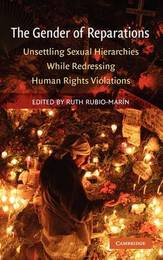
|
The Gender of Reparations: Unsettling Sexual Hierarchies while Redressing Human Rights Violations
Hardback
Main Details
| Title |
The Gender of Reparations: Unsettling Sexual Hierarchies while Redressing Human Rights Violations
|
| Authors and Contributors |
Edited by Ruth Rubio-Marin
|
| Physical Properties |
| Format:Hardback | | Pages:434 | | Dimensions(mm): Height 229,Width 152 |
|
| ISBN/Barcode |
9780521517928
|
| Classifications | Dewey:341.66 |
|---|
| Audience | | Professional & Vocational | |
|---|
|
Publishing Details |
| Publisher |
Cambridge University Press
|
| Imprint |
Cambridge University Press
|
| Publication Date |
31 July 2009 |
| Publication Country |
United Kingdom
|
Description
Reparation programs seeking to provide for victims of gross and systematic human rights violations are becoming an increasingly frequent feature of transitional and post-conflict processes. Given that women represent a very large proportion of the victims of these conflicts and authoritarianism, it makes sense to examine whether reparation programs can be designed to redress women more fairly and efficiently and seek to subvert gender hierarchies that often antecede the conflict. Focusing on themes such as reparations for victims of sexual and reproductive violence, reparations for children and other family members, as well as gendered understandings of monetary, symbolic, and collective reparations, this text gathers information about how past or existing reparation projects dealt with gender issues, identifies best practices to the extent possible, and articulates innovative approaches and guidelines to the integration of a gender perspective in the design and implementation of reparations for victims of human rights violations.
Author Biography
Ruth Rubio-Marin is a Chair in Comparative Public Law at the European University Institute, in Florence, Italy, and holds a tenured position in constitutional law at the Law School of Seville. She is author and editor of several books, including Immigration as a Democratic Challenge (Cambridge University Press, 2000), The Gender of Constitutional Jurisprudence (Cambridge University Press, 2004), and What Happened to the Women? Gender and Reparations for Human Rights Violations (2006).
ReviewsReview of the hardback: '... one of the greatest assets of the publication under review is the use of case studies and the richness and variety of good (and bad) practice examines. The unique and clear perspective adopted by all the contributors makes the volume a contribution to this field and an essential tool for those who work in this area. Therefore this collective work must be warmly welcomed, and it is to be hope that it will provide guidance to judges, practitioners, and policymakers.' Leiden Journal of International Law
|